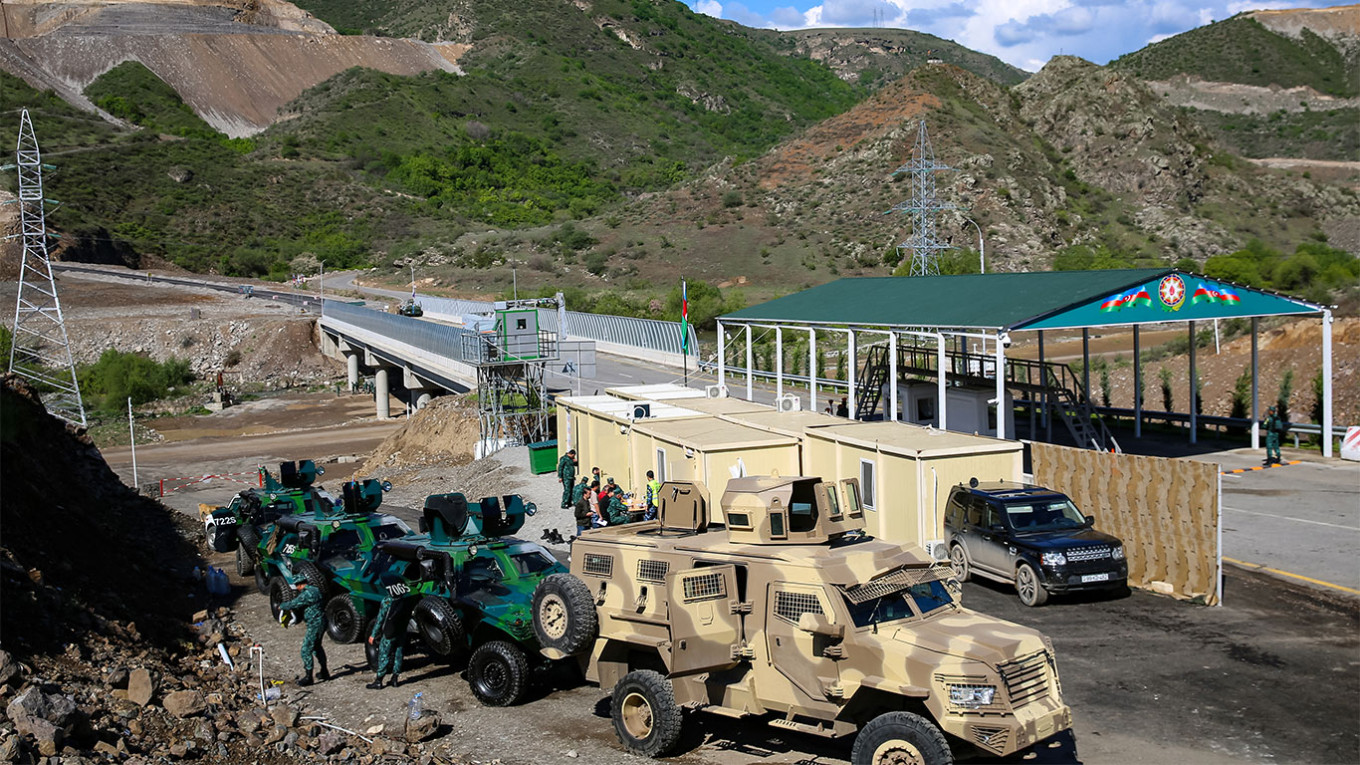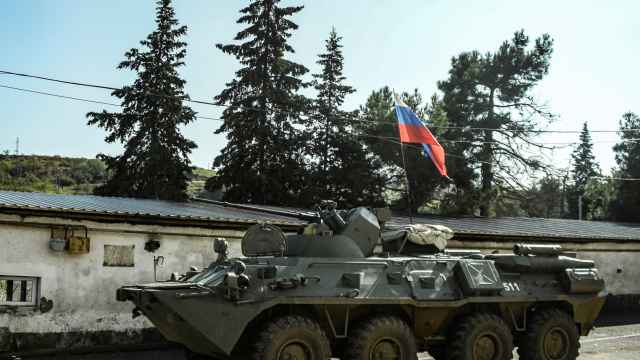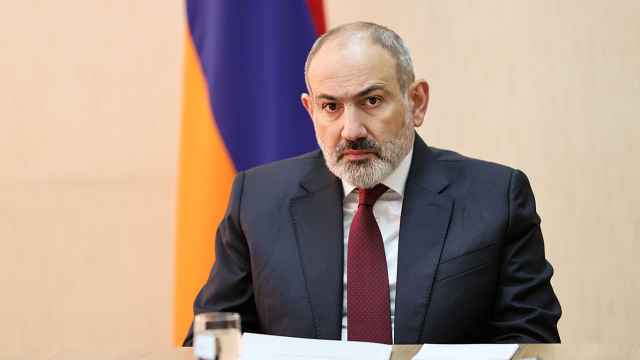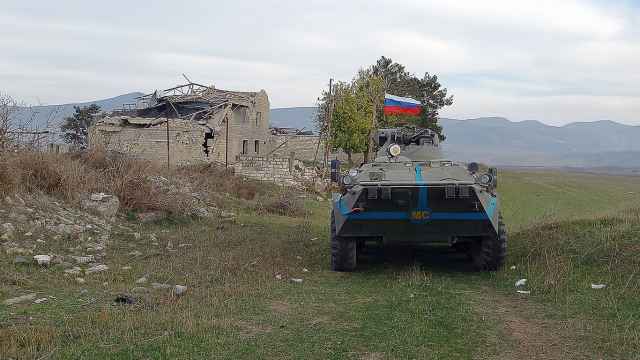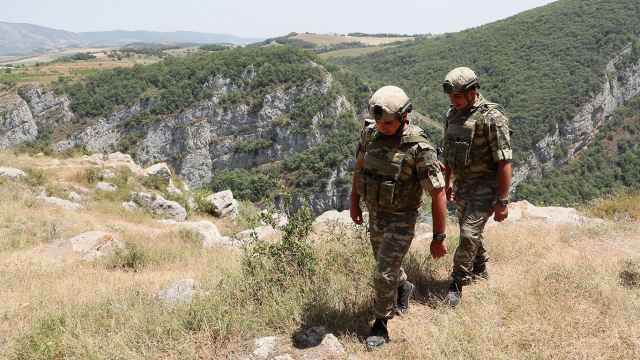Armenia and Azerbaijan on Thursday blamed each other for a deadly exchange of fire along their border, which threatened to derail momentum to resolve a long-running dispute days ahead of EU-led peace talks.
The United States and rival Russia both urged restraint between the Caucasus neighbors after the clash that left one person dead and injured four, the latest flare-up in a decades-long dispute over the Nagorno-Karabakh region.
Armenia initially said four of its soldiers had been wounded by incoming fire in an eastern region of the ex-Soviet country.
"Azerbaijani forces are shooting artillery and mortars at Armenian positions in the Sotk region," Armenia's defense ministry said.
Baku accused Armenia of a "provocation" that had left one of its soldiers dead.
It said Armenian troops had "once again violated the ceasefire agreement" with "large-caliber weapons", referring to an accord from November 2020 that ended six weeks of hostilities.
'Very little' chance for deal
Armenian Prime Minister Nikol Pashinyan and Azerbaijani President Ilham Aliyev have been scheduled to meet Sunday in Brussels for talks led by European Council President Charles Michel.
The rival leaders had also agreed to jointly meet the leaders of France and Germany on the sidelines of a European summit in Moldova on June 1, according to the EU.
Pashinyan on Thursday accused Azerbaijan of looking to "undermine the talks" in Brussels.
"I have not changed my mind about going to Brussels," he said in a statement, but warned there was "very little" chance of signing a peace deal with Azerbaijan at the meeting.
A draft agreement "is still at a very preliminary stage and it is too early to speak of an eventual signature," Pashinyan said.
The EU-led diplomacy comes after U.S. Secretary of State Antony Blinken brought the Azerbaijani and Armenian foreign ministers to Washington for negotiations in early May.
State Department spokesman Vedant Patel said the two countries should embrace in Brussels a proposal by Blinken that would distance forces along the border.
"This kind of violence, we believe — it undermines the progress made by Armenia and Azerbaijan toward a durable and dignified peace," Patel told reporters in Washington.
"We believe that there continues to be a durable path forward. We believe that there is a peaceful solution to this," Patel said.
Growing Western diplomacy
The West has stepped up mediation as the clout of Russia, historically the major powerbroker between the former Soviet republics, wanes due to its invasion of Ukraine.
In Moscow, Kremlin spokesman Dmitry Peskov said: "We expect a restrained approach from the parties and urge them not to take any actions that could lead to an increase in tensions."
Armenia has traditionally relied on Russia as its security guarantor but Yerevan has grown increasingly frustrated with Moscow.
It has accused Russia of failing to fulfill its peacekeeping role when Azerbaijani activists blocked the Lachin corridor, the only land link to Armenia.
The two countries have gone to war twice over disputed territories, mainly Nagorno-Karabakh, a majority-Armenian region inside Azerbaijan, which has close ties with Turkey.
Tens of thousands of people have been killed in the two wars over the region.
The first war lasted six years, until 1994. The second, fought in 2020, ended in a Russia-negotiated ceasefire.
Under that ceasefire, Azerbaijan is required to guarantee safe passage on the Lachin corridor, which is patrolled by Russian peacekeepers.
In a new escalation at the end of end April, Azerbaijan said it had built a checkpoint on the corridor following "threats and provocations" from Armenia.
Armenia denounced the move as a ceasefire violation and said the claims were a "far-fetched and baseless pretext."
A Message from The Moscow Times:
Dear readers,
We are facing unprecedented challenges. Russia's Prosecutor General's Office has designated The Moscow Times as an "undesirable" organization, criminalizing our work and putting our staff at risk of prosecution. This follows our earlier unjust labeling as a "foreign agent."
These actions are direct attempts to silence independent journalism in Russia. The authorities claim our work "discredits the decisions of the Russian leadership." We see things differently: we strive to provide accurate, unbiased reporting on Russia.
We, the journalists of The Moscow Times, refuse to be silenced. But to continue our work, we need your help.
Your support, no matter how small, makes a world of difference. If you can, please support us monthly starting from just $2. It's quick to set up, and every contribution makes a significant impact.
By supporting The Moscow Times, you're defending open, independent journalism in the face of repression. Thank you for standing with us.
Remind me later.


